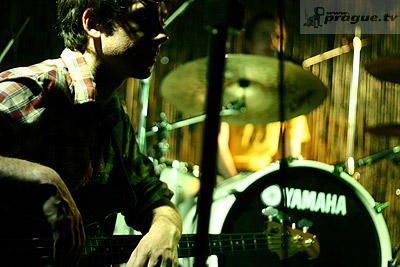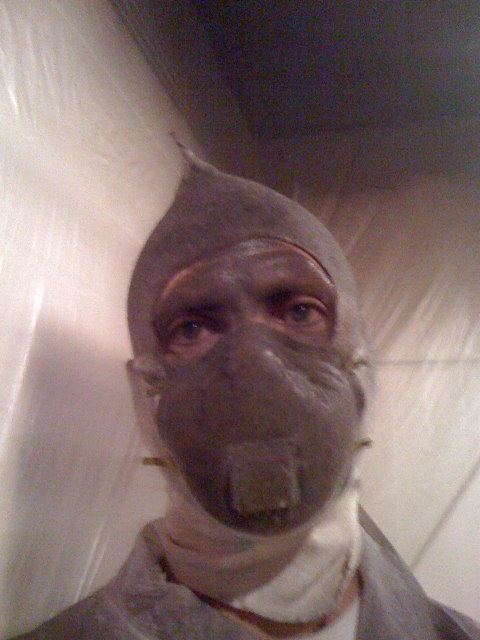interview by Luke Strahota
The career of Portland musician Jonathan Drews took off sometime around the mid ‘90s with the critically acclaimed power pop band, Sunset Valley, a staple of the Portland indie-rock scene up until its official farewell show in May of 2009. Since then he has established himself as a go-to player; performing, recording, and touring with such acts as Damien Jurado, Dolorean, China Forbes of Pink Martini, and Loch Lomond. At the onset of one of his projects, The Brilliant Channel, Drews began piecing together equipment used to record the band’s demos that now make up his home studio, Last of the Explorers. The studio has since then gone on to host recording sessions with a handful of Portland bands, as well as launch both his and partner Kaitlyn ni Donovan’s, careers into commercial and film soundtrack. For his most recent recording project, he recorded and engineered the latest release by The Boston Spaceships, the newest group led by the prolific Robert Pollard, lead singer and life-force behind the seminal ‘90s group, Guided By Voices.
Around the same time Drew’s music career took off, he unknowingly found himself entering into another career. And while it may not possess the same boasting credentials as working with rock stars, Drews has put the same energy and drive into making this career as much of a success as his music career.
# # #
How did you get started painting houses?
I had been working at Powell’s for four years as a book buyer. Sunset Valley was starting to take off and we were starting to tour. I was rapidly using up all my vacation and sick days. We had a big summer coming up so I had to quit Powell’s. I took the dive and went all in. That summer I started doing light construction work. It was kind of fun and it got me into learning some construction but it wasn’t going to last forever. It was well know around town that Andy Ricker was painting and he had a fondness for hiring people in bands. Andy was really dedicated and a hard worker and could keep you employed. We had done our touring and when we came back I needed work right away. Andy was great too because you could work your ass off for him for a while but then you could tell him you were going out on the road for four weeks two months down the road from now and he’d be like, “It’s fine.” He would let you go and have work for you when you came back. It balanced well with music whereas working retail or a 40-hours-a-week-structured-thing you’re more tied down.
How did it feel to leave the safety net of a steady job?
You feel really insecure and it’s a scary feeling when you’re just kind of dangling there and not knowing what’s around the corner. At the same time you’re 25 years old and it’s like, “So what?” You don’t feel that vulnerable and you adjust to it pretty quick, taking it a week at a time. Now I’m completely responsible for everything. I totally work for myself, I have to find work for myself, no one’s finding work for me, it’s all up to me. So there are periods where I don’t know what’s happening three or four weeks from now and the future is wide open … it can be pretty frightening. There are periods where sometimes I wish I was in a cubicle somewhere knowing I was going to be able to work there forever. Those unknowns are pretty nerve-wracking.
Can you draw any parallels between your two careers?
There are absolutely no parallels between scraping and painting the side of a house and miking drums! When I’m painting a house all I want to do is be in the studio. It’s kind of frustrating because my brain is imagining ideas and I’m hearing things and if I were at home I would totally be doing them. But if I’m here and I have idle time it can sometimes be hard to get motivated to get into the studio and work. At the end of a painting day I’m pretty beat and I like to just come home and a have a beer and chill. Sometimes all I need is an hour and later in the evening I’ll have a session where we record guitars or something like that. It’s all an exercise in getting your brain switched over. I can be really tired but as soon as I come down here I can get into the zone and do this work. But during the day when I’m working on someone’s house I don’t want to be there. I want to be here. One thing that has been good is that painting gives you time to think about being creative. The challenge is to come home, see it through, and make that commitment.
Painting is a really structured job. No matter if you’re stripping and re-staining someone’s kitchen cabinets or rolling walls out or painting the outside of someone’s house, it’s a series of steps and it’s the same thing with recording a song. You have to start with your foundation, get everything ready before you can put all the toppings on. You do all your prep work and start painting. You mic up the drums and make sure everything is alright, get it tracked and start overdubbing and all the fun stuff that goes on top of it. So there is a parallel in the work flow, but that can apply to anything. But painting has been a great exercise in efficiency because I’m painting just to make money, so you learn how work quickly and orderly and be as efficient as responsible as possible and I try to apply that down here. It helps keep me focused and stay on task, I guess that’s the closest parallel. Whether you’re painting a house or you’re trying to maintain a creative flow, don’t get distracted, stay the course and keep the project moving.
Have you always had this work ethic?
I’ve been a really diligent and loyal, really dependable worker. My first job ever was pumping gas at a gas station then delivering pizzas, but I’ve always showed up when I’m supposed to and I work hard, I like working hard, I like feeling tired at the end of the day. I haven’t had to learn a work ethic, I’ve always kind of had one. A lot of times what I think about during the day is what I’d rather be doing with my life rather than painting. I feel like my biggest challenge in life is trying to find my niche. I’ve sort of been carving one out for myself, but I mean, painting is difficult on my body, it’s toxic, it’s good honest work but I don’t really feel like it’s me, but maybe that really shouldn’t matter, I’m paying the bills and keeping a roof over my head.
Do your painting clients know about your music career?
I don’t really divulge that to my clients. I have a lot of repeat customers and if I have a relationship with one of them that I’ve had for a while and we’re beyond just chatting about the paint job, then they’ll learn little bit about me. I kind of keep that side of me private as far as my painting customers go. I don’t come out and broadcast that I play in a band, because it’s like “Of course you do, that’s why you’re painting houses!”
So your job reflects the commitment toward your passion for music.
That’s kind of how it is. That’s something I think about all day too when I’m painting. My parents didn’t listen to rock music at all, so I didn’t think adults listened to rock music and I thought at some point that I was just going to outgrow this. I put a limit on myself at one point that at 35, I was going to get serious and get a real job or whatever. I’m almost 41 now and I’m kind of doing the same thing. The one thing I realize is that there is no shame in what I do and I’m pretty proud of it. But you can’t stop making music. I just realized that at some point and I’m not going to quit. My attitude has changed, I’m not concerned about getting signed or making a million dollars, that’s all bullshit. My attitude and my goal is to have just as much fun with it as possible and keep it a very positive element of my existence.
Do you think an artist can become successful and still maintain a day job, or do you have to starve?
I think a real artist is going to be pretty dedicated to what they do, I think they’re going to make time for it in any capacity they can. It all comes down to lifestyle and how simply you can set yourself up to create. That’s the trick, that’s the real challenge and the balance. Things like being in a band: you can’t really have a day job because you have to leave town, but you can be creative about how you make money and have a job that’s super flexible like doing construction work or painting or doing something that’s seasonal. There’s ways to work around it. I don’t think anyone has to starve to do what they really love to do, it’s just a matter of balancing their time.
Do you think day jobs are something an artist can live with?
Yeah, but I think anything can be a day job. I know this guys who does a lot of recording who refers to miking drums and doing basic tracks as hanging sheet rock. You’re going to find tedium in anything you do. It’s always going to be draining in some capacity. I think the biggest thing is keep your overhead low so you don’t have to work as much. If you can live on $500 a month you got it set. You can create opportunities for yourself by just by making adjustments and changes. Having a studio has not only allowed me to record bands but I’ve also been composing for commercial work. Suddenly that’s more income that been happening. It’s diversifying yourself and using the tools you have in as many ways possible. As you’re going through life and you’re laying the bricks in front of yourself, you’re creating opportunities and side paths that will push you a little bit forward. I just try to keep looking ahead.
My goal is to not have to paint. Sometimes I feel really shitty for being a painter. One of the things I think about every day is how I’m going to get out of painting and I honestly have no idea. Recording is a step in the right direction. It’s growing every year, but then you look at other people who are producing and recording full time and they’re barely getting by. But at least they don’t have to report somewhere every day and break their back for someone else. There are times when working for yourself can be really stressful when you don’t know when you’re going to work again. When the economy tanked last spring I wasn’t getting any calls. But since I’ve diversified I was able to get that commercial job so that could tide me through another few weeks. In those periods of uncertainty, you really wish you had a real job and worked for a business that gave you benefits and health insurance and a paycheck you could rely on. But I honestly don’t know what I could do to apply to a business that would do that. I’ve cut this path for myself.
You can contact Jonathan Drews for painting or jingles.
# # #

